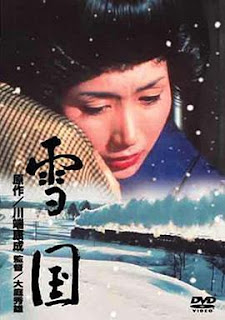48. Soaⁿ ê chit-pêng iáu bô seh
Niá-pan ùi kheh-chàn tī chhia-thâu ê chiap-kheh-sit chhut-lâi, thong-ti kóng tih chián-phiò ah.
Kan-ta ū sì-gō͘-ê chhēng àm-sek kôaⁿ-thiⁿ-saⁿ ê pún-tē lâng, tiām-tiām khí-lo̍h-chhia.
"Góa m̄ khì goa̍t-tâi. Chài-hōe." Komako khiā tī hāu-chhia-sit koaiⁿ tio̍h ê thang-á-mûi lāi-bīn. Ùi hóe-chhia téng khòaⁿ kòe-khì, yi ná-chhiūⁿ sī hong-iá kóe-chí-tiàm ê chi̍t-ê kî-koài kóe-chí, ko͘ chi̍t-ê hông pàng bē-kì tī mûi-ian hun o͘ ê po-lê-siuⁿ lāi-té.
Hóe-chhia khí-kiâⁿ liáu-āu, hāu-chhia-sit ê po-lê-thang kuiⁿ khí-lâi, Komako ê bīn tī kuiⁿ khí-lâi hit-sî hut-leh phû-hiān, iū-koh siau-sit khì. Hit-ê bīn hām hit-kang chá-khí seh chiò tī kiàⁿ lāi-té hit-ê âng kì-kì ê bīn kāng-khoán. Chāi Shiamamura lâi khòaⁿ, che iū-koh sī thoat-lī hiān-si̍t ê hit-lō sek.
Hóe-chhia ùi pak-pêng peh chhiūⁿ pian-kài ê soaⁿ, nùi ji̍p tn̂g-tn̂g ê pōng-khang, kôaⁿ-thiⁿ ē-tàu àm-hun ê ji̍t-thâu, ná-chhiūⁿ khì hō͘ tē-ē ê o͘-àm thun khì, mā ná-chhiūⁿ kó͘-ló͘ sō͘-kó͘ ê hóe-chhia kā bêng-liāng ê gōa-khak thùiⁿ tī pōng-khang lāi, tī têng-têng tha̍h-tha̍h ê soaⁿ tiong-kan, ǹg chiap-kīn hông-hun ê soaⁿ-kheⁿ kiâⁿ lo̍h-khì. Soaⁿ ê chit-pêng iáu bô seh.
Iân hô kiâⁿ chi̍t-khùn-á, lâi kàu pêⁿ-iûⁿ, soaⁿ-téng ká-ná chhiat kòe, chhut-hiān chi̍t-chōa jiû-bí ê siâ-pho, it-ti̍t chhun kàu hūiⁿ-hūiⁿ ê soaⁿ-kha, soaⁿ-téng ní goe̍h-sek. Thiⁿ-téng iáu ū chhián-chhián ê àm-hê, chheng-chheng chhó-chhó hián-chhut soaⁿ ê khóng-sek hêng-iáⁿ. Goe̍h-sek í-keng m̄-sī pe̍h ê, m̄-koh he chhián sek mā bô kôaⁿ-thiⁿ àm-mê hit-chióng chheⁿ-chhìn ê kám-kak. Thiⁿ-téng bô pòaⁿ-chiah chiáu-á. Soaⁿ-kha ê pêⁿ-iûⁿ bô jia bô cha̍h, siang-pêng hūiⁿ-hūiⁿ khoah khui, boeh kàu hô piⁿ ê ūi, khiā chi̍t-keng ná chúi-le̍k tiān-chhiáng ê pe̍h-sek kiàn-bu̍t. Che sī ùi chhia-thang khòaⁿ tio̍h, sī ta lo͘-lo͘ ê tang-thiⁿ boeh-àm chìn-chêng iáu khòaⁿ ē tio̍h ê kéng-tì.
In-ūi sio-khì, thang-á khai-sí khí-bông, gōa-kháu lâu-tāng ê iá-gōa chiām-chiām àm ah, po-lê téng iū hiàn-chhut sêng-kheh pòaⁿ thàu-bêng ê hêng-iáⁿ. Che oán-jiân sī hit-kang hông-hun kéng-sek chhut-hiān tī kiàⁿ lāi ê pá-hì. Lāu kah thè-sek ê kū chhia-siuⁿ, kòa saⁿ-sì chat niâ, che ká-ná sī pa̍t-liâu sòaⁿ-lō͘, m̄-sī Tokaido (東海道) sòaⁿ ê. Tiān-hóe mā àm-àm.
--
48. 山 ê 這爿猶無雪
領班 ùi 客棧 tī 車頭 ê 接客 sit 出來, 通知講 tih 剪票 ah.
干焦有四五个穿暗色寒天衫 ê 本地人, 恬恬起落車.
"我毋去月台. 再會." Komako 徛 tī 候車 sit 關著 ê 窗仔 mûi 內面. Ùi 火車頂看過去, 她 ná 像是荒野果子店 ê 一个奇怪果子, 孤一个 hông 放袂記 tī 煤煙薰烏 ê 玻璃箱內底.
火車起行了後, 候車 sit ê 玻璃窗 kuiⁿ 起來, Komako ê 面 tī kuiⁿ 起來彼時忽 leh 浮現, 又閣消失去. 彼个面和彼工早起雪照 tī 鏡內底彼个紅 kì-kì ê 面仝款. 在 Shiamamura 來看, 這又閣是脫離現實 ê hit-lō 色.
火車 ùi 北爿 peh 上邊界 ê 山, nùi 入長長 ê 磅空, 寒天下晝暗分 ê 日頭, ná 像去予地下 ê 烏暗吞去, mā ná 像 kó͘-ló͘ sō͘-kó͘ ê 火車 kā 明亮 ê 外殼 thùiⁿ tī 磅空內, tī 重重疊疊 ê 山中間, ǹg 接近黃昏 ê 山坑行落去. 山 ê 這爿猶無雪.
沿河行一睏仔, 來到平陽, 山頂 ká-ná 切過, 出現一逝柔美 ê 斜坡, 一直伸到 hūiⁿ-hūiⁿ ê 山跤, 山頂染月色. 天頂猶有淺淺 ê 暗霞, 清清楚楚顯出山 ê 紺色形影. 月色已經毋是白 ê, 毋過 he 淺色 mā 無寒天暗暝彼種秋凊 ê 感覺. 天頂無半隻鳥仔. 山跤 ê 平陽無 jia 無閘, 雙爿 hūiⁿ-hūiⁿ 闊開, 欲到河邊 ê 位, 徛一間 ná 水力電 chhiáng ê 白色建物. 這是 ùi 車窗看著, 是焦 lo͘-lo͘ ê 冬天欲暗進前猶看會著 ê 景致.
因為燒氣, 窗仔開始起濛, 外口流動 ê 野外漸漸暗 ah, 玻璃頂又現出乘客半透明 ê 形影. 這宛然是彼工黃昏景色出現 tī 鏡內 ê 把戲. 老 kah 退色 ê 舊車廂, 掛三四節 niâ, 這 ká-ná 是別條線路, 毋是 Tokaido (東海道) 線 ê. 電火 mā 暗暗.
--
48.
A porter from the inn came to tell them that the gate to the tracks was open.
Four or five villagers in somber winter dress got on and off the train.
"I'll not go to the platform with you. Good-by." Komako stood inside the closed window of the waiting-room. From the train window it was as though one strange piece of fruit had been left behind in the grimy glass case of a shabby mountain grocery.
The window of the waiting-room was clear for an instant as the train started to move. Komako's face glowed forth, and as quickly disappeared. It was the bright red it had been in the mirror that snowy morning, and for Shimamura that color again seemed to be the point at which he parted with reality.
The train climbed the north slope of the Border Range into the long tunnel. On the far side it moved down a mountain valley. The color of evening was descending from chasms between the peaks. The dim brightness of the winter afternoon seemed to have been sucked into the earth, and the battered old train had shed its bright shell in the tunnel. There was no snow on the south slope.
Following a stream, the train came out on the plain. A mountain, cut at the top in curious notches and spires, fell off in a graceful sweep to the far skirts. Over it the moon was rising. The solid, integral shape of the mountain, taking up the whole of the evening landscape there at the end of the plain, was set off in a deep purple against the pale light of the sky. The moon was no longer an afternoon white, but, faintly colored, it had not yet taken on the clear coldness of the winter night. There was not a bird in the sky. Nothing broke the lines of the wide skirts to the right and the left. Where the mountain swept down to meet the river, a stark white building, a hydroelectric plant perhaps, stood out sharply from the withered scene the train window framed, one last spot saved from the night.
The window began to steam over. The landscape outside was dusky, and the figures of the passengers floated up half-transparent. It was the play of that evening mirror again. The train, probably no more than three or four worn-out, faded, old-fashioned coaches strung together, was not from the same world as the trains one finds on the main lines. The light inside was dim.
--


No comments:
Post a Comment